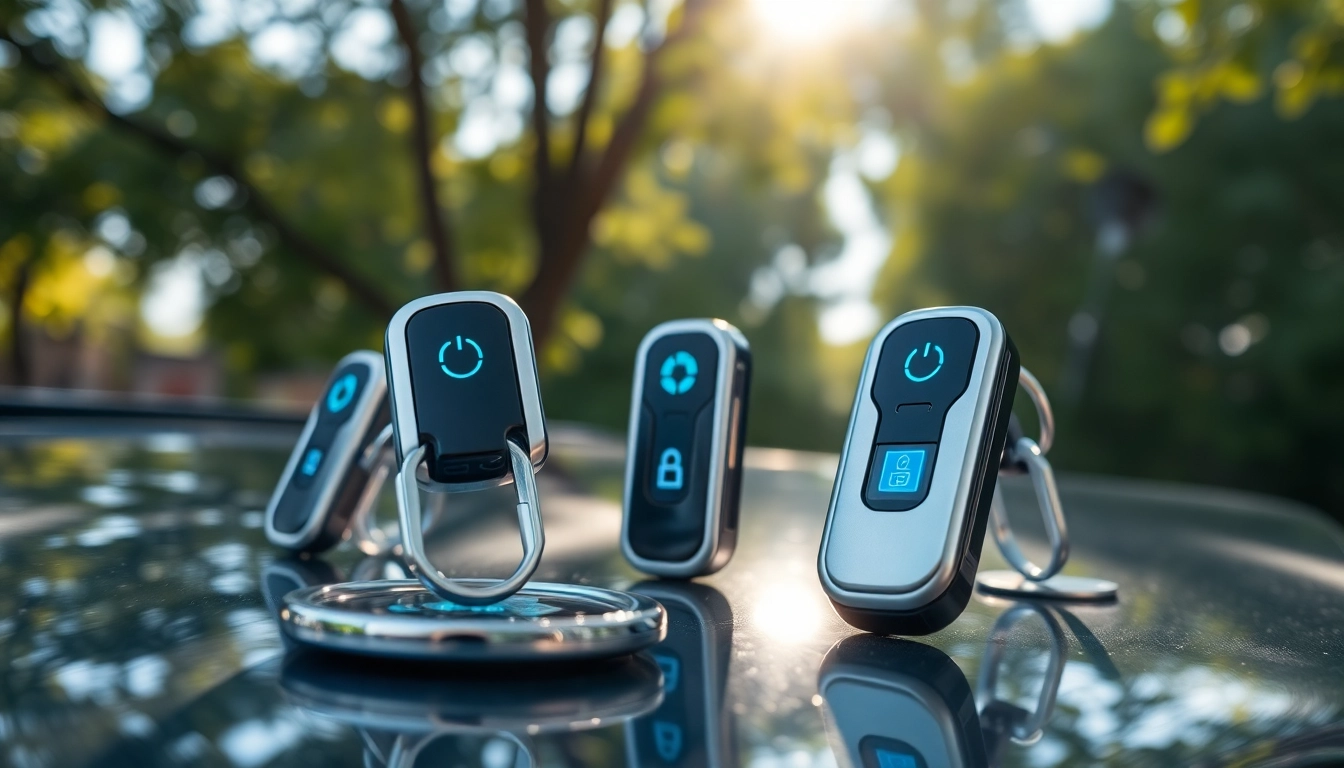Introduction to Keys for Electric Cars
The transition to electric vehicles (EVs) is reshaping the automotive landscape, with technology at the forefront of this change. One crucial aspect that has evolved significantly is the key system utilized in electric cars. Understanding the Keys for electric cars is essential for current and prospective EV owners. This article provides an in-depth look at what electric car keys are, the different types available, their technological advancements, security considerations, user experiences, and emerging trends. Through comprehensive exploration, we aim to enhance your knowledge about these innovative keys that can redefine your driving experience.
What are Electric Car Keys?
Electric car keys differ vastly from traditional keys used in combustion engine vehicles. They serve the same purpose: to lock and unlock the vehicle and provide a means of starting it. However, the mechanisms and technologies involved have evolved. Many electric cars now utilize key fobs, mobile applications, or even biometric recognition, incorporating a higher level of convenience and security into their design. Their integration of technology also allows for a range of functionalities, such as remote start, climate control, and vehicle diagnostics.
Types of Keys for Electric Cars
Understanding the types of keys available for electric vehicles is essential for consumers, as various systems cater to different user needs:
- Traditional Key Fob: Remotely controls locking and unlocking of the car and sometimes includes features like starting the engine. Though they resemble old-fashioned keys, these fobs utilize advanced technology.
- Smart Key Systems: Often referred to as keyless entry systems, these allow the driver to unlock and start the vehicle without manually using a key. The car detects the key fob in the driver’s pocket or bag, providing a hands-free experience.
- Mobile App Integration: Many manufacturers now offer mobile apps that function as keys. Drivers can lock, unlock, start, and even monitor their vehicles through their smartphones. This method utilizes Bluetooth or cellular technology.
- Digital Key Systems: Emerging technology allows cars to be operated using smartphones as digital keys. This allows seamless control, negating the need for a physical key altogether. Some digital keys enable remote sharing with others.
- Biometric Access: While not yet commonplace, biometric systems using fingerprint or facial recognition technology hold exciting potential for future vehicle access.
Importance of Technology in Keys for Electric Cars
The technology behind electric car keys is not merely a trend; it has practical implications for convenience, user experience, and security. Advanced technology allows for features that enhance safety, such as automatic locking when the driver walks away from the vehicle or the ability to track the car’s location through GPS. Moreover, as vehicle technology continues to evolve towards automation, these key systems lay the groundwork for new functionalities that enhance the overall driving experience.
Features of Keys for Electric Cars
Smart Connectivity Options
Connectivity is at the heart of modern electric car keys. By operating through Bluetooth, NFC (Near Field Communication), or cellular networks, these systems can support various features:
- Remote Access: Users can remotely control their vehicles to lock/unlock doors, start the engine, or even precondition the cabin temperature during extreme weather conditions.
- Sharing Capabilities: Digital key technology enables car sharing without physically handing off a key, allowing multiple users to access the vehicle through their smartphones.
- Integration with Smart Home Systems: Some keys can interface with smart home devices, enabling unique functionalities such as unlocking the door upon detecting the driver’s approach.
Battery Life and Performance
The battery life of key fobs and smart keys is crucial. Most modern key fobs are designed with longevity and efficient power consumption. Typical key fobs can last for several years on a single battery, while smartphone apps rely on the device’s battery. Strategies to maximize battery life in both fobs and smartphones include:
- Turning off the key fob when not in use.
- Avoiding exposure to extreme temperatures.
- Regularly updating smartphone apps to ensure optimal performance.
Durability and Design Considerations
The durability of electric car keys is as important as their functionality. Key fobs are designed to withstand daily wear and tear, often featuring water-resistant or shockproof casings. The aesthetic design has also evolved to match the sleek, modern look of EVs, often coming in several colors or finishes. Attention to materials used, such as high-grade plastics or metals, plays a role in the key’s longevity and tactile appeal.
Security Aspects of Keys for Electric Cars
Understanding Keyless Entry Security
With advanced technology comes the need for enhanced security measures. Keyless entry systems utilize encryption to protect against unauthorized access. Understanding how these systems work is essential for owners:
- Encryption: Most modern keyless systems utilize rolling codes that change each time the car is accessed, making it difficult for hackers to duplicate the frequency.
- Physical Security: Many vehicles with keyless entry still have traditional key backup options in case of battery failure or electronic malfunctions.
Pros and Cons of Digital Key Systems
Digital key systems present numerous advantages:
- Convenience: No need to worry about losing a physical key.
- Remote Accessibility: Control features from anywhere via a smartphone app.
However, there are drawbacks:
- Dependence on Technology: Problems with app functionality or battery life could hinder access.
- Vulnerability: Potential security risks if the smartphone is compromised.
Preventative Measures Against Key Fob Theft
As advanced as these keys are, they are not immune to theft or hacking. Implementing security measures can help safeguard against unauthorized access:
- Fob Shielding: Utilizing protective sleeves or pouches that block RFID signals can prevent relay attacks.
- Smartphone Security: Employing strong passwords, biometrics, and regular software updates can mitigate smartphone vulnerabilities.
User Experiences with Keys for Electric Cars
Convenience of Digital Keys
The convenience of using digital keys has been a significant point of adoption among users. The ability to access a vehicle without fumbling around for a key has been well-received. Additionally, integration with smart device ecosystems allows users to sync their vehicle functions with other smart home devices seamlessly.
Common Challenges Users Face
Despite numerous benefits, some users encounter issues with electronic keys:
- Forgetfulness: Users sometimes forget to charge their smartphone or replace the key fob battery, leading to inconvenient lockouts.
- Technical Glitches: Unexpected software updates or app malfunctions can prevent keyless entry from working effectively.
Best Practices for Using Keys for Electric Cars
To maximize the efficiency and lifespan of electric car keys, consider the following best practices:
- Regularly check battery levels of key fobs and replace them timely.
- Keep software for smartphone apps updated to benefit from the latest features and security improvements.
- Store smartphone safely and secure against unauthorized access.
Future Trends in Keys for Electric Cars
Emerging Technologies in Key Design
As technology evolves, new innovations in key design are on the horizon. Features under development include:
- Biometric Systems: Leveraging fingerprint or facial recognition technologies could provide an additional layer of security.
- AI Integration: The use of artificial intelligence to adapt keys to user preferences and driving habits is a possibility.
Predictions for Future Key Functionality
Looking ahead, we can expect keys to offer even more functionalities. Predictions include further integration with smart ecosystems, expanded remote control capabilities, and real-time vehicle diagnostics that can be monitored directly from a user’s smartphone.
Impact of Autonomous Vehicles on Key Systems
As vehicles move toward autonomy, the role of keys will inevitably change. In fully autonomous vehicles, the need for physical keys may diminish entirely, as users could summon a car via smartphone with no need for traditional access methods. This paradigm shift will redefine not only car ownership but also interactions between users and their vehicles.


